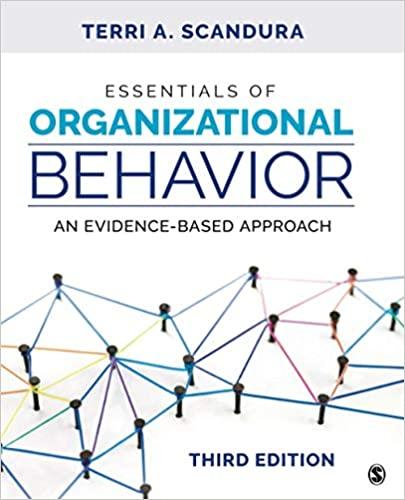Daniel Pink, in his 2009 book Drive: The Surprising Truth About What Motivates Us, discusses three forms
Question:
Daniel Pink, in his 2009 book Drive: The Surprising Truth About What Motivates Us, discusses three forms of motivation as “operating systems.” Motivation 1.0 was humankind’s inherent need to survive. The next operating system, Motivation 2.0, was the carrot-and-stick approach (or the rewards and punishments we discussed in reinforcement theory research). Pink is critical of the carrot-and-stick approach, pointing out the carrot and the stick can produce results that are the opposite of what leaders are looking for because rewards can transform an interesting task into drudgery; they can turn play into work. For those driven by intrinsic motivation, the drive to do something because it is interesting is essential for high creativity and motivation. Pink presented what he believes is the next operating system for human motivation—Motivation 3.0, which centers on intrinsic motivation. Pink highlighted autonomy as one of the most important motivating factors at work. He said that people want control over the task (what they do), time (when they do it), team (who they do it with), and technique (how they do it).26 Pink gives the example of the software company Atlassian giving all engineers 1 day a quarter without any job assignments, responsibilities, or supervision. Employees work on whatever they want, with whomever they want, and report the results. Pink says that the employees generate more new ideas on this day than any other. Pink’s Motivation 3.0 is not without its critics. In fact, Atlassian does pay its employees for performance. Employees receive an annual performance bonus of almost 30% of their salary, and their innovative output is assessed. Most of Atlassian employees’ time is paid for work that is not autonomous. However, 10 years after the publication of his book, Pink maintains that human beings, by their very nature, are self-directed, and this is the key to motivation......
Discussion Questions
1. Discuss Pink’s premise in light of what you have learned about the effectiveness of positive reinforcement. Do you feel that he has a valid criticism of rewards and punishments? Why or why not? 2. Do you agree that intrinsic motivation is a preferable way to influence performance? Why or why not? Why is autonomy so important to intrinsic motivation?
3. What other factors do you think are important for increasing intrinsic motivation?
Step by Step Answer:

Essentials Of Organizational Behavior An Evidence-Based Approach
ISBN: 9781544396781
3rd Edition
Authors: Terri A. Scandura





